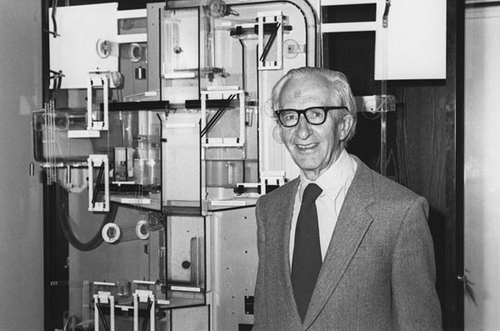Meade, J. E. 1907-1995
Enlarge text Shrink text- His The rate of interest in a progressive state ... 1933.
- His Stagflation, c1982:t.p. (James E. Meade) CIP data sheet (James Meade)
- Planning and the price mechanism, 1994:CIP t.p. (J.E. Meade) introd. (James Edward Meade; b. 06-23-1907, Swange, Dorset; educ. at Oxford and Cambridge, in politics, philos., economics; prof., London Sch. of Economics, etc.; still living 1994)
- Wikipedia, 19 Aug. 2008:James Meade page (James Edward Meade (June 23, 1907, Swanage, Dorset -- December 22, 1995, Cambridge) was a British economist)
James Edward Meade FBA (23 June 1907 – 22 December 1995) was a British economist who made major contributions to the theory of international trade and welfare economics. Along with Richard Kahn, James Meade helped develop the concept of the Keynesian multiplier while participating in the Cambridge circus. In the 1930s, he served as specialist adviser on behalf of the British government at the Economic and Financial Organization of the League of Nations.: 477 Born in Swanage, Meade was brought up in Bath, and educated at Lambrook prep school, Malvern College and Oriel College, Oxford, where he read classics till 1928 before switching to the newly-established course in philosophy, politics, and economics. He was elected a Fellow of Hertford College, Oxford in 1930, and was a lecturer in economics at Oxford from 1931 to 1937. During the Second World War, he was recalled to the Economic Section of the Secretariat of the War Cabinet, which he chaired from 1946 to 1947. He was appointed CB in 1946, and served as President of the Royal Economic Society from 1964 to 1966. While his work was not confined by political boundaries, he advised the Labour Party in the 1930s, and was a member of the Social Democratic Party during the 1980s. He once said that he had “my heart to the left, and my brain to the right”. In 1976 he received an Honorary Doctorate from the University of Bath. Along with the Swedish economist Bertil Ohlin, he received the Nobel Memorial Prize in Economic Sciences in 1977 "for their pathbreaking contribution to the theory of international trade and international capital movements". In 1981 he attracted attention as one of the 364 economists-signers of a letter to The Times who questioned Margaret Thatcher's economic policy, warning that it would only result in deepening the prevailing depression.
Read more on Wikipedia >
 Personality
Personality



